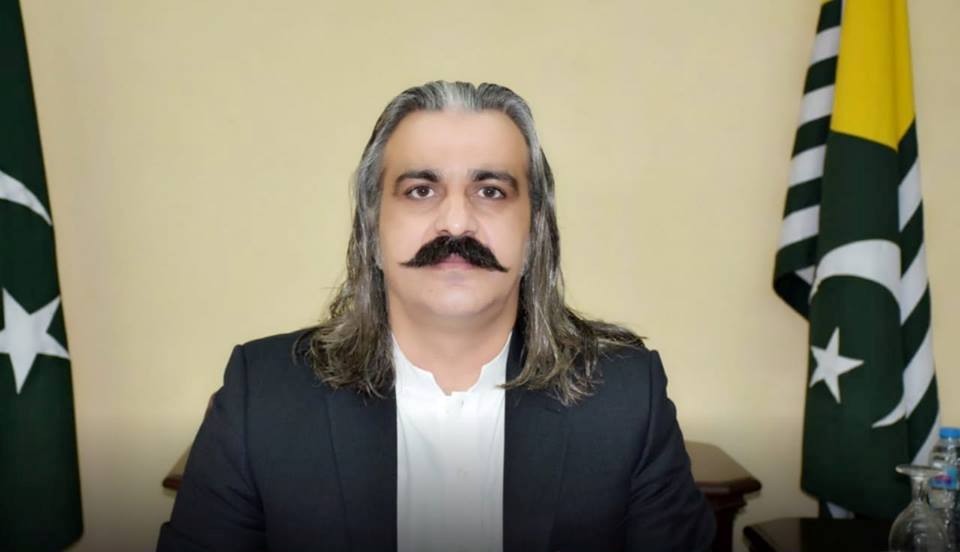Lahore: Dejected and angry at the way the civil and the military leadership ‘surrendered the state’s writ’ in agreeing to the demands of the Faizabad sit-in participants, many Pakistanis in and out of the country had taken to the social media to vent their frustration. Among these concerned citizens was Imaan Mazari-Hazir, a Pakistani student at the University of Vienna’s Law School.
In a video message, she had censured state institutions responsible for national security for their role in brokering an agreement with dharna leaders. She spoke in an acerbic tone, justifying use of harsh terms (retracted later) on grounds that after the signing of the agreement [with Labbaik leaders notorious for their use of foul language and cuss words] it seemed to be the only way to make oneself heard in Pakistan.
As the video went viral, an online smear campaign also went underway. Doctored images and videos started circulating on social media platforms. Mazari-Hazir’s supporters asserted that by slandering her and her mother Shireen Mazari, Pakistan Tehreek-e-Insaf (PTI) leader, the cyber bullies had only proved her point.
In an email interview with Daily Times, Mazari-Hazir, who has practiced law and worked as a researcher in Islamabad before she proceeded to Vienna for graduate studies, says the smear campaign has been vicious and unrelenting. “The tactics reek of the deep state’s involvement. I have faced unsubstantiated and baseless allegations,” she says.
“While I expressed deep regret and sincerely apologised for my harsh choice of words, the fact is that the entire stream of criticism that has been levelled against me has been baseless. I have clearly stated in my video message that we must honour the sacrifices of our soldiers. No one in their right mind can attack or criticise those laying down their lives for the country. It is not those jawans with whom I have any problem but with the top brass of the military leadership, who cannot be immune from criticism,” she says.
During the vicious propaganda, Mazari-Hazir says she has also been accused of being an ‘Indian agent’. “This dangerous culture of labelling [dissenters] is so prevalent and endemic in our society that those using such slurs may really start believing in them,” she says.
Among the doctored videos circulated on social media was one posted from the account of an employee of the Fauji Fertiliser. “Those posting these fakes remain unapologetic for their propaganda. There have been videos posted by all sorts of men, attacking my character and my family. I have been called so many awful things that are not appropriate for print or broadcast media so I will refrain from citing that abuse here.
“Pictures of my best friends and I have been circulated with baseless and untrue allegations that I’m a lesbian. I have received death threats, filthy abuse and hate messages in my personal email account, on my YouTube channel, on Facebook and on Twitter,” she says.
“These men have never bothered raising their voices over the multitude of issues facing Pakistan,” she adds. Mazari-Hazir stresses that such dirty tactics are not new. “Every single time I̵7;ve criticised the security establishment, I, like many others, have been the victim of such ruthless attacks on character. Such tactics are only employed by those who lack counter-arguments,” she says.
Asked if she is considering legal action, Mazari-Hazir says she will soon register a case in Europe against a certain individual who has given her a death threat through his social media channel. “Little did he realise in his misplaced fury that here, in Europe, they take death threats quite seriously. I̵7;ve already alerted the police in Vienna of the existence of this video,” she says.
On the video posted by a man appearing to be an army officer, she says she and her friend watched it together over Skype and were in fits of laughter because the man criticised the PTI and her mother but never once responded to any of the arguments she had raised.
“He wasn’t even aware of the fact that I had criticised the PTI dharna as well. If he really is an army soldier, his reference to a general’s sifaarish for the reserved seats was a rather stupid admission of the military’s role in politics,” she says, “I was quite surprised to see the video because I̵7;m aware that serving soldiers are not allowed to have social media accounts. Other men like him have chosen this opportunity to try and build up some kind of following by joining the boot-polishing bandwagon. I honestly was not affected at all.”
Mazari-Hazir says she is in touch with her family, discussing how to deal with the smear campaign. “They have picked a time when I̵7;m pursuing a very difficult masters’ degree programme that requires my full attention. My lawyers and my family are considering legal action but perhaps the best advice I̵7;ve received, thus far, has been to just ignore this campaign,” she says. She adds that the campaign cannot damage her cause or affect her ability to pursue it. “To stop for every mud-slinging lunatic will be a waste of my time and energy,” she says.
On her apology issued through Twitter over the use of a particular word, she clarifies that it was not because of the smear campaign. “I do not bow down to pressure of this kind. I issued an apology only to the extent of the words I used, and not on the substance of my arguments. I used the now retracted word to make two key points. My first point was to show that people would react extremely negatively to the use of that word even though the very same people had not uttered a word against those who used abusive and offensive language sitting in the federal capital for 20 days. This clearly exposes the hypocrisy of our society. Those physically burning the country will not be opposed out of fear, but women will be attacked for challenging such elements,” she says. Mazari-Hazir says her second point was to highlight the hypocrisy of state institutions. “We saw violent, hate-filled protestors attacking public property and law enforcement officials, preceded by the adoption of truly disgusting language against government officials and national heroes such as Edhi sahab. And on the other hand, we saw our military establishment not only equating our law enforcement agencies with violent, abusive protestors but also paying cash to those protestors,” she says.
“The fact is that by distributing money to protesters Punjab Rangers DG has sent a loud and clear message that those who challenge and attempt to derail the civilian government will be supported and facilitated by the security establishment,” she says.
Mazari-Hazir says such an impression is owed also to the history of military’s meddling in politics. “They have used political parties ever since the PML-N government came into power. While there are personnel in the ruling party who have sympathies with radical groups, the fact is that the recent attempt to mainstream extremists, including the TLYR and hate-mongers like Hafiz Saeed is a very clear continuance of the military establishment’s strategy to use fanatics as a weapon of fear against those who challenge its role in the political system,” she says.
“The military, as an institution, belongs to every Pakistani. It is in our best interest, as a nation, to point out wherever we believe it has gone wrong and to recommend how best to move forward. This is the right of every tax-paying Pakistani citizen and those exercising this right cannot be labelled anti-state,” she says.
Asked about her opinion on ways in which the prevailing environment of fear should be countered, she says there are many Pakistanis who feel uncomfortable about excesses of power within the country’s politico-legal system, but unfortunately, ‘we are not as organised as the radical groups that have been funded and facilitated by the powers-that-be for the last many decades’.
“It is time we, too, start mobilising and networking so as to move forward in a more meaningful way, so as to engage with the powers-that-be on public policies for a better and safer Pakistan. The time has come to speak up, whether through articles, television appearances or grass-roots mobilisation and awareness campaigns.
“We have been disorganised and apathetic for far too long. The responsibility to bring change rests on our shoulders too, and we cannot continue to shy away from it because of ‘fear’ or plain indifference.
Mazari-Hazir says that previously she was a member of the Pakistan Tehreek-e-Insaf (PTI), but she left the party only a few months after joining it owing, among other things, to the rampant cyber-bullying carried out by the party’s social media team.
At present, she says she is not affiliated with any political party in Pakistan nor does see herself making such an affiliation in the near future.
“In terms of manifestos, I find myself leaning towards the Pakistan People’s Party (PPP), but unfortunately manifestos for all mainstream parties remain relevant only on paper. There’s a desperate and growing need for at least one political party that can challenge the dominant establishment-backed narrative in Pakistan.
“There isn’t any such party in the status quo and till there is, I don’t see myself relating to any of the mainstream parties. Moreover, witnessing the entry of radical groups such as the TLYR in our political mainstream makes any affiliation, at present, almost impossible.”
Published in Daily Times, December 7th 2017.










